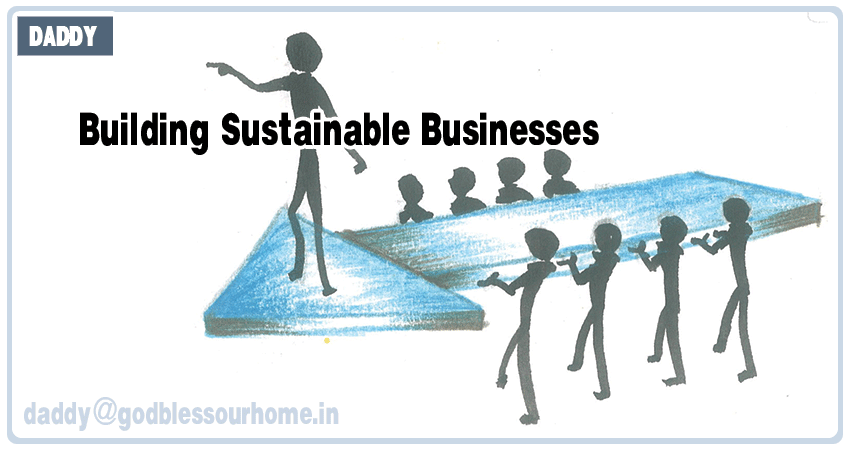

Earthquake of Fukushima asks us – Is nuclear energy worth these risks? Destruction by Nature can be dealt with but why unnecessary death? Why so much harm to human life and environment? One could argue that nuclear power poses calamitous threat. How can we justify the adoption of such method of energy production given the possibility of high negative impacts? These questions trouble me more because I have prepared the Proposed Project Schedule for one of India's Nuclear Power Project. Radiation Leak also reminds us our world is a system that connects space, time, nature and humans. World is a system in which living beings exist because of nature's consent and nature can withdraw its consent without any notice. World is a system in which everything is connected; pollution in Japan affects life in Australia and contamination of rivers in Pakistan affects fish stocks in Sri Lanka. How mature are our Corporate? Like teenagers businesses only seem to be concerned with possessions, appearance, image and instant gratification. Consider a typical teenager. He/ She would probably try to prove his independence from parents. Live without regard to consequences of his/her behavior? Now, if we put all businesses together as one individual, then isn't that persons also like a teenager? Trying to prove independence from parents (Nature/God)? Recklessly consuming all resources? Living as if everything would last forever? Making mess in house - polluting air, water and land? Just as parents teach their children not to over spend; and choose a future and not just drift through life; it is high time that our businesses do their homework! Problems in the world of business and need of sustenance Question is can we humans successfully sustain ourselves and our goals without exhausting the natural resources we depend upon? Natural resources, which are capital for many businesses, have started disintegrating. Ecological imbalance is increasing. Although Mother Nature charitably produces resources, she does not do it at the speed of our greedy consumption. For instance, to make one pound comb of honey bees must collect nectar from about two million flowers. Direction is more important than speed and growth for the sake of growth is the ideology of the cancer cell. Various life species are endangered and many are becoming extinct. Land, water, air and sea have been functionally transformed from life-supporting systems into repositories for waste. Business practices/policies we endorse today will have an impact on our children and generations to come. For example, oil which serves as lubrication between machine parts, has created friction/war among nations. The world needs to break its addiction from oil and find alternatives. Children today cannot recognize even ten types of trees but over hundred corporate logos. Increasing consumerism is destroying our world. Ecological footprint model by Mathis Wackernagel states that, mankind requires nearly one and a half planets to support its current consumption levels. Ralph Torrie adds, “Environmental refugees now outnumber refugees from war." Modern concept of sustainability was popularized by 1987 World Commission Environment and Development (Brundtland Commission) Report, “Our Common Future". Word ‘Sustain' comes from the Latin, “Sustinere” meaning “To Uphold" or “To bear the weight of". Other definitions include “To keep going" and “To endure without giving away or yielding". Sustenance is living and working in a way that does not jeopardize the planet, human society and its economics. Sustenance is our inter-generational responsibility to ensure that our planet, our home is able to absorb human waste, goals and support all life forms. Sustenance is our collective responsibility Companies sacrificing our long term common good for selfish short term profit are public enemies. Aspirations of free-trade, globalization and diminishing national boundaries should not collide with nature's balance. A 2007 Globe Scan poll of 25 countries said that people hold companies completely responsible for improving education and skills in communities, responding to public concerns, increasing global economic stability, reducing human rights abuses and reducing the rich-poor gap. Many lawsuits are being filed - against automobile companies for the cost of their alleged damage to ecosystems; against tobacco companies for their alleged misleading of smokers about the dangers and addictiveness of cigarettes; and against fast food companies for the alleged responsibility for their customers' obesity! Earlier, little thieves were hanged but great ones escaped. With Information and Communication Technology becoming backbone of the democracy, corporate cannot run away from paying the true cost of their profits, the inconvenient ecological truth. Clearly, if businesses do not change their direction, then we are likely to end up in turmoil. We cannot afford the risk of inaction or else a day will come when all trees will die and all rivers will be poisoned. To keep the shop open today, companies need business practices and strategic decisions that support not only economic and environmental sustainability but also social, political and cultural sustainability. MNCs/Corporates are drivers of change and leaders of progress “Change” - which appears as a threat to common man, is seen as opportunity in business world. If we wish to make our world a better place to live in, it is important to have involvement of multiple driving forces. Multinational companies have developed ability to accept changes and work in new conditions at a faster rate than society in general. In Chinese, word ‘Crises' is composed of two characters. One represents danger and other represents opportunity. With their resources, technology, global reach and ability to innovate corporate are good in managing risks and convert dangers into opportunities. Corporates have proved that they are impressive instruments for financial progress. With their reach to lives of great number of citizens, MNCs can also be a platform to make social changes possible Corporates can and must play a multidimensional role, especially when they talk of corporate citizenship. They have the potential to transmit important values to society as a whole. Modern economic system must enable creation of a social sustainable and ethical society. India and Sustainability The security of people and nations rests on four pillars - food, energy, water and climate. They are all closely related, and all under increasing stress - Tom Burke. India cannot abandon its economic aspirations. Billions of Indians living under poverty line compel Government and Society to give equal priority to social, ethical and environmental sustainability along with economic growth. India is also evolving from Socialism of Mahatma Gandhi to Capitalism of Sonia Gandhi. Trouble with Tata's Nano was a reminder of wide gap between the rights of poor farmers and the aspirations of Corporate India. Our key challenges are climate change, pollution, resource depletion, health, hygiene, nutrition, poverty and inequality. If these issues are not addressed soon, they will create insurmountable barriers to our country's economic growth. In the book “Nickel and Dimed", Barbara Ehrenreich has elaborated how in America, despite economic progress, social conditions are deteriorating since resources are not shared equitably. Barbara points out that collective social goals and ethics are keys for socially sustainable society. THREE POINT AGENDA FOR ACTION : 1. We must think Green
|
1. We Must Think Green The era of ‘abundance' is over. The future will see our natural resources, from oil to food, having some level of restriction placed on them - Andy Bond. No country is hidden from dangers of carbon pollution. We keep on blaming industry and traffic for pollution but forget that we ourselves are the traffic and industry people. Green thinking is not just planting trees or Reduce-Reuse-Recycle philosophy. Green thinking is not just “Control” but “Prevention” of Waste/Pollution. Control meaning cleaning up waste after it has been created. Prevention means minimizing or eliminating waste before it is created. Sustenance is also Green technology breakthroughs! Don't wait for Electricity to reach Villages, Create Solar Power, Wind Power and Battery Power - There is huge market and long term profit as well. For instance, matchstick is a transportable and pocket able fire. Before it was invented, people laughed at the idea just as they do if someone today suggests having an air conditioner of the size of a pen. For Lovin, Green thinking is known as Natural Capitalism, which states that business strategies built around the radically more productive use of natural resources can solve many environmental problems. In fact waste of one industry/area should be made input to other or should be composted into its natural nutrient so that it is returned to ecological system or should be manufactured into new products. Green thinking is needed in City Planning! We need to revive our existing cities and also new townships on principles of innovation, quality with sustainable solutions of transportation, residential, energy, recreational, healthcare and education. Ota City, outside Tokyo is Japan's first Solar City. Three-quarters of the town's homes are covered by solar panels distributed for free. Vatican City, hopes to become world's first solar powered country. They plan to spend 660 million USD to create 100MW solar power plant for its 40,000 households. Vatican is also considering introducing Electric Vehicles. Energy Saving Light bulbs installed in the city are reported to have cut the energy consumption by an estimated 40%. Green thinking is LEED (Leadership in Energy & Environmental Design). Gaining international recognition, LEED attempts to make buildings/township using strategies of energy savings, water efficiency, CO2 emissions reduction and improved indoor environmental quality. A 2003 analysis of 60 LEED buildings found that they were on average 25-30% more energy efficient. 2. Not just for profit but for common good "The moral test of society is how it treats those who are in the dawn of life …the children; those who are in the twilight of life… the elderly; and those who are in the shadow of life… the sick… the needy… and the disabled." Sustainability is also about Social Justice. Corporate must prioritize and integrate social response to social problems, such as rights of disabled children. Inclusion of disabled/needy should also be mandatory in our growth. Vedas say, “There is no letter which does not have charm; there is no root which does not have a curative property; there is no man who is not able; rare is the person who knows its proper application”. Disability does not mean disqualification. Handicap gives them opportunity to focus more! If disabled people are trained to do just one thing well say art, music or writing, they will be needed by someone. Disability is also not limited to person needing wheel chair. Impairment could be Visual/ Hearing/ Intellectual/ Emotional/ Development Delay. Remember “Taare Zameen Par”? Disabled people may appear underdogs but they can become hero! It may appear that organizations like SASR are working in the dark. Imagine what a world would be if they were not in the dark anymore. Common good can also be with profit! For example the second biggest city of Canada, Montreal has started to build green houses on the top of commercial buildings where vegetables can be grown all year long. This not only served local consumption but also earned them money for community development. If poor people are not markets/consumers then let's make them! If socially sustainable society is to be built, these people must be brought to main stream. Low income deteriorates living, working and psychological conditions. Such people need support, nurturing for common good. 3. Spiritualism has an important role! We abuse land because we regard it as a commodity belonging to us. When we see earth as a community to which we belong, we may begin to use it with love and respect. Some may ask: Sustainability itself is a complex moral concept, then why involve religion? Answer is - Spiritualism reflects a holistic/universal view while interpreting life's complicated issues. Spirituality pervades in every sphere of life, be it business, management, governance or health care. Spiritualism can halt degenerative trends in all these areas and can be our remedial response to today's overwhelming techno economic intoxication In greed of future profits our businesses have deviated from social moral orbit. The spirit of sustenance is basically reviving ancient ethical and value system which is to respect God's creations. Only spiritualism can cure the worst evil – our indifference towards others! India Intellect says, “Vasudev Kutumbhukam” and includes Plants, Animals, Mountains and Rivers as living identities in our way of living. Traditional Business motto of India is “Shubh Labh”: Shubh means benefit and betterment of everyone which must be combined with Labh meaning profit. We should not be ruled by profit maximization but to pursue business aims profitably! Holy River Ganga has been adored as Mother. In this emotional personification lies the true secret of ecological conservation and holiness. Even today, people passing by or bathing in Ganga, join their palms, bow to the divine river as mark of respect/ affection to her bounties. Such superior spiritual prudence is much better than business rationality of treating river as water resource. Hence, conservation of Ganga and all rivers can be better achieved by strengthening and reinforcing our spiritual and sacred attitude! Similarly, why not see oil etc as milk of mother-nature? Corporate should not be like a child wanting to make money from mother's milk? Conclusion “We need a new system of values, a system of the organic unity between humankind and nature and the ethic of global responsibility." - Mikhail Gorbachev. Role of business needs to be redefined. Given a rapidly morphing business landscape organizations need to be highly adaptable and at the same time connected to reality by taking action towards a societal goal. This will make them socially responsive and sustainable; and also make our world better by small and incremental actions Vision of Free Trade Globalized world must be characterized by implementation of welfare reforms that promise a better life for all sections of society. It is unfortunate that we have to fight our own people, our own governments and corporate to save our planet, our home. But world's largest fires can be extinguished with a cup of water at the right time. Future of India is dependent upon good work of our corporate; our economic engines. Good Future of India is dependent upon Innovative and sustainable approach based on our cultural diversity, social values and ancient spiritual acumen. Only better thinking...
|
|---|






